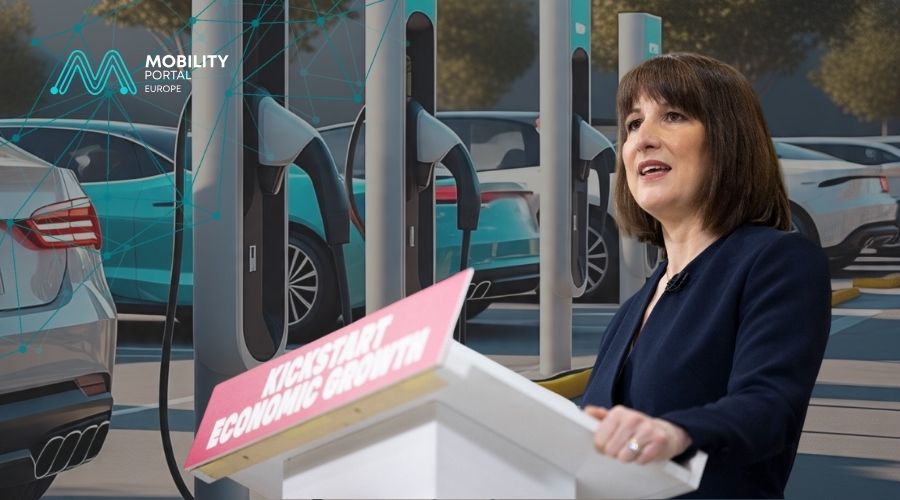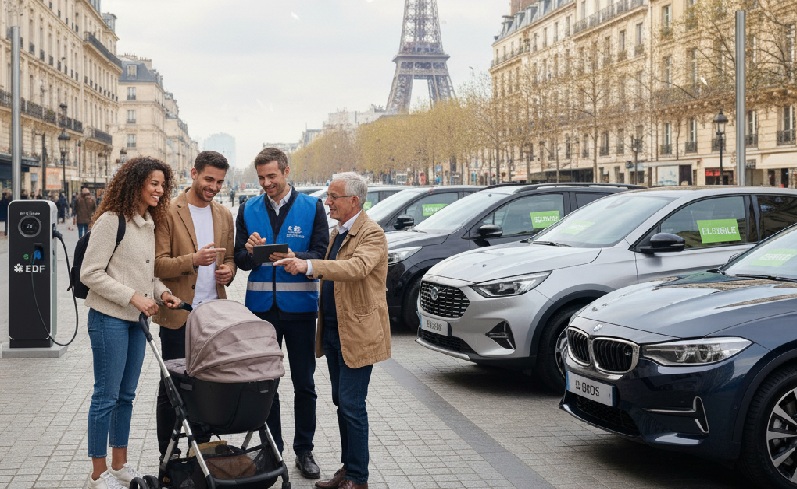Last month, the United Kingdom (UK) carried out a budget review addressing key allocations to boost E-Mobility.
Chancellor Rachel Reeves pledged 2.6 billion pounds to decarbonise transport over the next three years.

This includes 1.4 billion pounds to support the continued uptake of electric vehicles (EVs), including vans and heavy goods vehicles (HGVs).
In addition, 400 million pounds has been allocated to support the development of charging infrastructure.
However, Dunstan Power, Director of ByteSnap Design and its EV charging division Versinetic, told Mobility Portal Europe that “it is still unclear how the remainder of the budget will be spent.”
E-mobility Subsidies: Which Ones Make Sense – and Which Don’t?
Countries that currently lead in EV sales, such as Norway and Denmark, introduced high taxes on cars years ago. They recognised that vehicles pollute, congestion is a problem, and maintaining infrastructure is costly.
At the same time, they developed effective public transport systems.
When the first EVs appeared, they chose to exempt them from these taxes, making them cheaper than petrol cars.
“Citizens not only didn’t see prices rise, but also realised these cars were actually cheaper. So it was easy to convince them,” says Power.
He contrasts this with the UK’s approach: “The problem the United Kingdom faced—along with other countries that didn’t impose high taxes on conventional cars—was that EVs were more expensive, partly because production volumes were low and the technology was new. That’s why the market needed an initial boost.”
However, Power acknowledges that there are now several low-cost electric vehicles available in the country.
That’s why he suggests that “perhaps continuing to directly subsidise EVs is no longer the best use of public money.”
“It would be good to have a free market for electric cars, without high tariffs, and to support manufacturers in staying competitive,” he adds.
It’s also worth noting that, unlike five years ago, there is now a strong second-hand electric market, making used EVs more affordable.
So, considering that the price of new cars is falling and used EVs are now accessible, “the argument that we need to subsidise new units is becoming less convincing.”
In this regard, he says subsidies should now focus on understanding why some people still haven’t adopted EVs—and on addressing those barriers.
One major issue, he explains, is that many people don’t have home parking where they can install a charger, nor do they have access to on-street charging points.
“Minister Reeves must not be intimidated by the lobby”
There is no doubt that the current British Government is showing a firmer commitment to E-Mobility.
“The previous administration held a critical stance towards electric vehicles. In contrast, the current one seems more receptive to scientific evidence and aligned with the energy transition,” the executive states.
However, he laments that E-Mobility has become a politically charged issue.
“Five years ago, there was a general consensus that it was a positive development, but over time, powerful lobbying efforts have pushed back,” Power warns.
Since the matter involves the use of public funds, he acknowledges that it inevitably takes on a political dimension.
“The problem is that the debate has become polarised. People adopt extreme positions: either everything about EVs is good, or everything is bad,” he says.
In this context, Power stresses: “Minister Reeves must not be intimidated by the lobby, which has politicised an agenda that should not be so ideologically driven.”
UK launches programme to power UK auto investment and jobs
Yesterday, the Government announced the launch of DRIVE35, which comprises new and enhanced funding competitions.
UK auto firms will benefit from a £2.5 billion commitment over the next decade that will support thousands of jobs and help ensure the UK remains at the forefront of zero-emission vehicle development.
The programme will fund a wide spectrum of projects which help the transition to zero-emission vehicle manufacturing – targeting established high-volume manufacturing and multi-billion-pound gigafactories, all the way to start-ups, prototypes and cutting-edge automotive innovation.
Business and Trade Secretary Jonathan Reynolds says: “We’re helping British carmakers get to the front of the pack by working hand in hand with investors to build a globally competitive electric vehicle supply chain in the UK as we deliver our Plan for Change.”
The Department for Business and Trade also announces over 300 million pounds for specific UK automotive manufacturing firms and projects.
This includes over 100 million pounds of capital investment for UK automotive manufacturing via the ATF, approximately 140 million pounds in combined Government and industry R&D investment, and 18 million pounds from the new 150m pounds Connected & Automated Mobility (CAM) Pathfinder programme.
Mike Hawes, SMMT Chief Executive states: “The creation of this dedicated automotive programme is further evidence of the sector’s importance to economic growth. Delivered as part of the Industrial Strategy, DRIVE35 has the potential to unlock investment and innovation in the UK, supporting jobs and creating wealth across the country.”
Ian Constance, CEO, Advanced Propulsion Centre UK and Zenzic indicates: “This new investment underlines the commitment from Government to secure advanced manufacturing in the UK. I am pleased that the APC, Zenzic, and its delivery partners are here to facilitate a new wave of funding in the automotive industry, supporting innovation, driving scale-up, and enabling transformation.”
READ MORE
-
6 days left: How to make EV charging stations reliable, visible and durable?
On 5 November, Data Modul will host a web seminar on HMI solutions for EV charging stations — a must-attend event for manufacturers seeking to innovate and optimise their products.
-
Rightcharge secures £1.6M to boost EV charging payments for Europe’s fleets
Public charging remains fragmented and reimbursing employees for home charging is often slow and error-prone. However, fleets using Rightcharge can reduce charging costs by up to 90%.
-
Strong demand for France’s social EV leasing with 41,500 cars already leased
To date, over 41,500 vehicles have been leased, including more than 11,360 by beneficiaries who live or work in areas where air quality is a concern.











